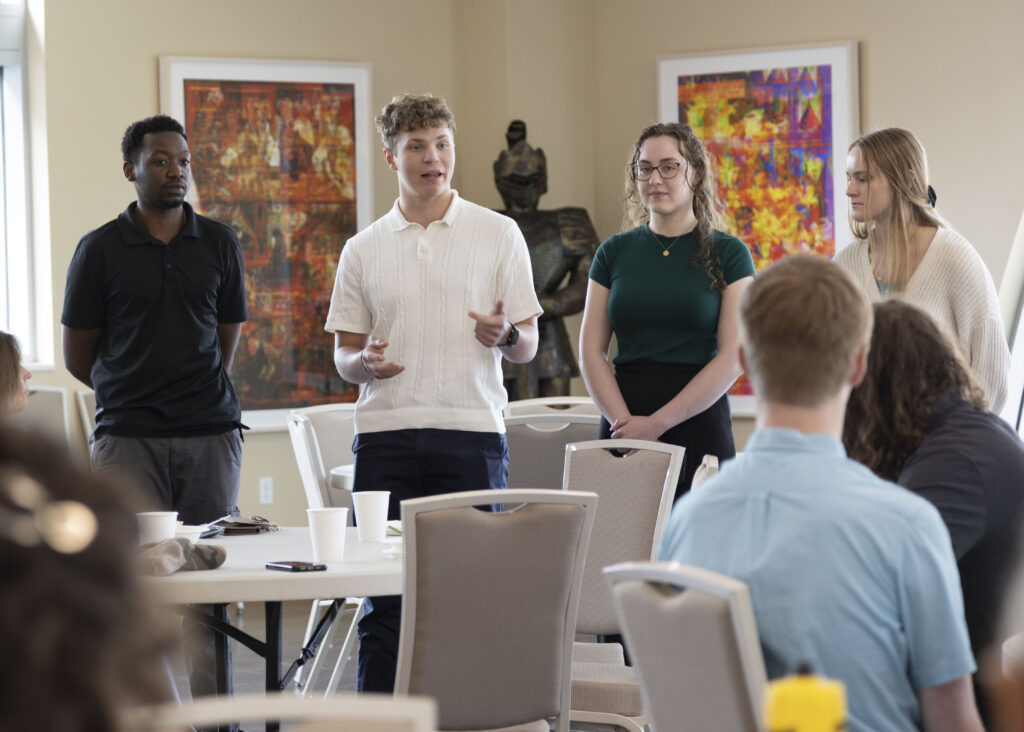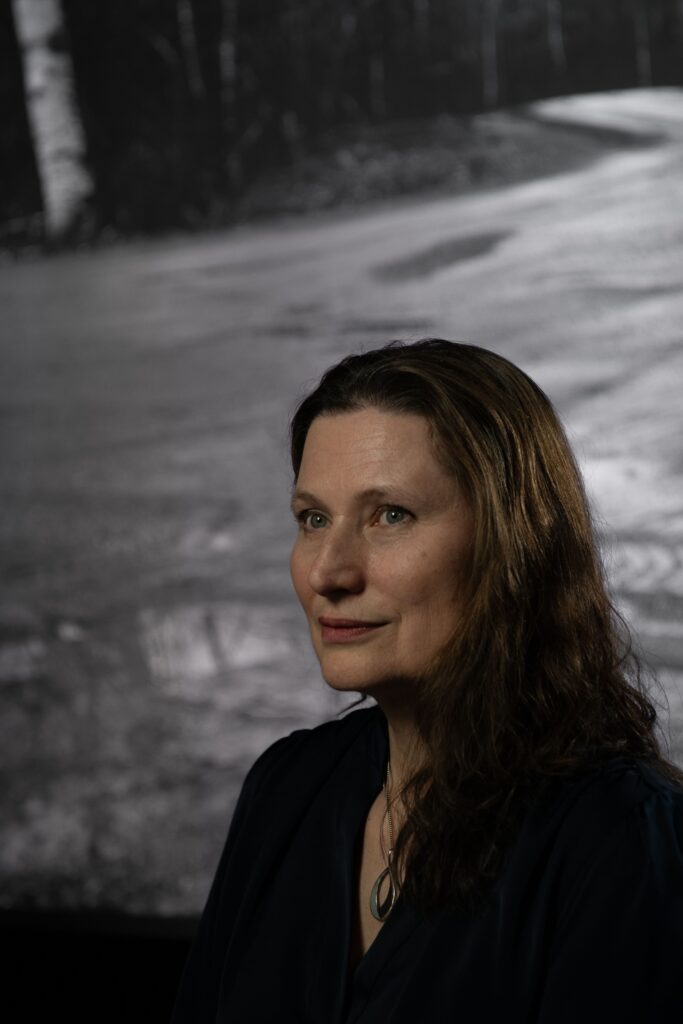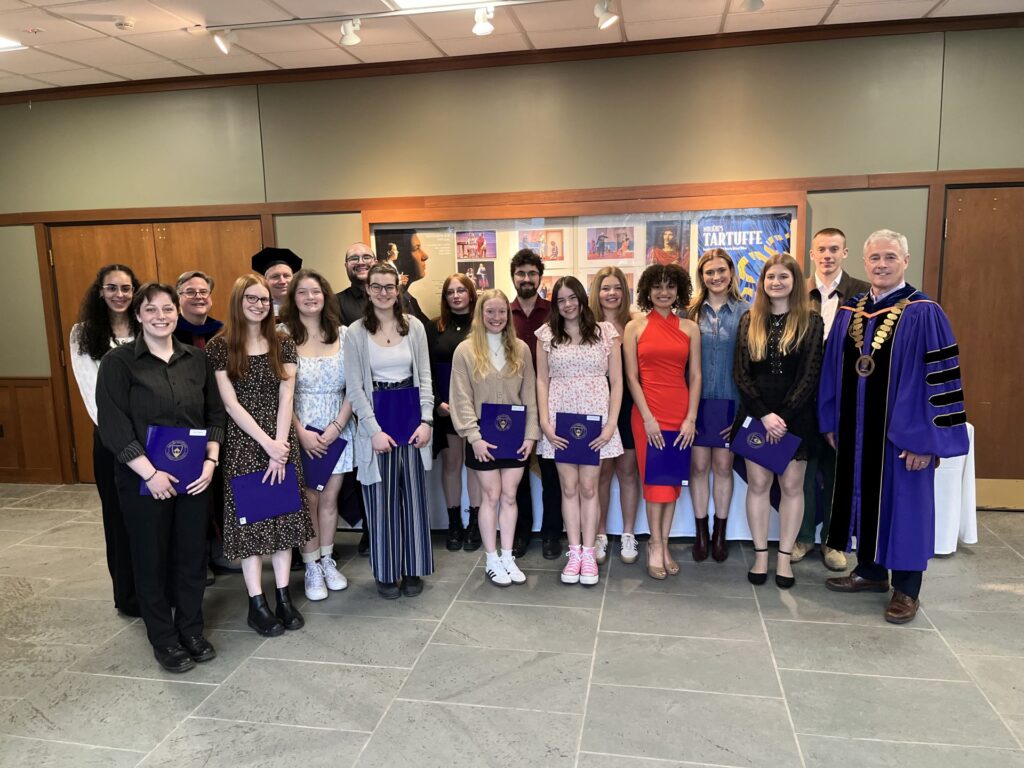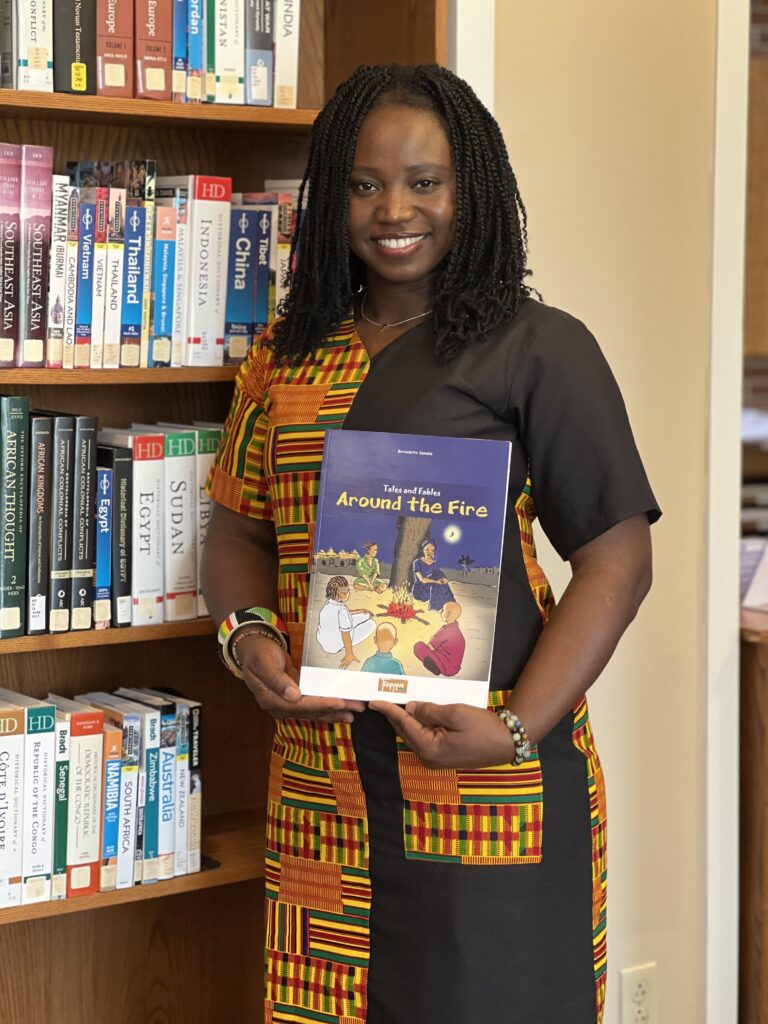Inaugural Global Issues lecture by Rowena He shines pro-democracy light
Human rights champion and expert on China shares deep affection for Saint Michael's, where she once taught history, with a warm cross-generational audience

Rowena He interspersed humor into her also often intense presentation. (all photos by Alex Bertoni)
The distinguished and fearless Chinese history and human rights scholar Rowena Xiaoqing He never uses notes in her frequent lectures around the world dedicated to keeping the light of democracy alive by speaking truth to power.
“What we’ll create in the next hour is us,” Professor He said to start her talk Wednesday evening at Saint Michael’s College, speaking extemporaneously from the heart as she walked among former faculty colleagues, students and others in the Dion Center Roy Room. The topic of her presentation with PowerPoint slides was “Lighting Candles in Darkness: From Tiananmen to Hong Kong.”
The speaker said she particularly appreciated having a cross-generational audience. “What we saw tonight was a beautiful illustration of engagement from both the campus community and general public,” she said. “We had a 15-year-old high school student from Burlington, a 90-years-old couple of concerned citizens, teachers from Vermont Commons — a private high where I had been invited to give a talk — and professors-emeritus and former colleagues who came with their spouses, along with Father Marcel Rainville and Father Brian Cummings from the campus Edmundites, and the whole administration — Dean Gretchen Galbraith and President Lorraine Sterritt and her husband, plus Jeffrey Trumbower, the vice president for academic affairs.”

With President Lorraine Sterritt.
Professor He’s stream-of-consciousness delivery, honed and polished from years of such appearances, drew from deeply felt, often risky and high-stakes episodes through her life and career. Describing her commitment to supporting and finding strength in students, colleagues and friends, she spoke with particular warm affection about her time at Saint Michael’s. “I feel so comfortable being here – it’s my home,” she said.
A former history professor at Saint Michael’s, the speaker currently is an associate professor of history at the Chinese University of Hong Kong and 2022-23 National Humanities Center Fellow in Research Triangle Park, NC.
At the invitation of Jeffrey Ayres, director of the College’s two-year-old Institute for Global Engagement, Professor He delivered the inaugural talk for the Center’s Global Issues lecture series, discussing the legacy of the 1989 Tiananmen Square protests and massacre, and the censorship of historical memory. She is an expert in modern and contemporary Chinese society and politics, especially efforts by the Chinese government to repress or cover up information and history. Born and raised in China, she is interested in the nexus of history, memory and power, and their implications for youth values, identity and social change.
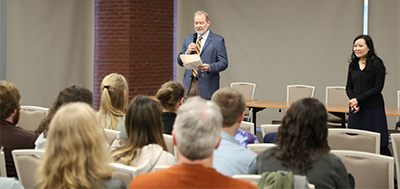
Professor Jeffrey Ayres of the political science and international relations faculty, director of the Institute for Global Engagement, invited and introduced Rowena He.
All those topics wove into Wednesday’s presentation, with frequent asides and tangents that came together with logic and power by the end. Here are but some snapshots to provide a sense of the lecture:
Near the start, she spoke of her appreciation for the good turnout at such a busy time during the spring semester. “You are very lucky – this is a great community of solidarity,” she said, especially thanking her emeritus History Department friend, George Dameron, who took the chance to hire her even realizing the “inconveniences” it might entail.
The speaker shared that she often does not want to even watch news or talk about it these days, saying, “I think this regular radicalizing and brutalizing each other is quite scary.”
She told of arriving in Hong Kong after her year at the Institute for Advanced Studies at Princeton that directly followed her time at Saint Michael’s – that was 2019, and she was “thrown into an unprecedented social movement…many worried that I would be arrested” as the political situation worsened during that movement. She even signed legal documents to state that if she was arrested and forced to make false statements, they would not be true, she said.
Rowena He said while it was suggested to her not to use her latest book title for a lecture title, as with this appearance, “I thought nothing is more appropriate since I was attracted to this school when I saw its commitment to truth and justice. I thought, ‘this should be the title for St. Mike’s.’”
With slides, she told in some detail of harrowing moments in Hong Kong in recent years with her students as authorities there tightened control. A central part of the story involved a custom in Hong Kong after Tiananmen of lighting candles in Victoria Park on the anniversary to remember victims, but the government now has stopped and forbidden what He and others regarded as such a beautiful and powerful symbolic initiative to bring light to darkness. “So, with no more candle lights, I want to be sure you get a good idea of what Tiananmen was about and why it was important,” she told the audience — much as she tells her students.

The speaker walked around the room as she spoke.
She focused, too, on another powerful symbol of growing repression, when a well-known statue of the “Goddess of Democracy” in Hong Kong suddenly was removed by authorities on Christmas Eve in 2021. A week later she was invited to speak in chapel where she found herself unable to speak since to her it felt like “all the symbols on earth — the candle lights in Victoria Park and the statue — were gone. I had nothing to inspire others when I was losing the sources that gave me hope. I had to seek light in darkness.”
She told how in 2019 when she had just arrived in Hong Kong amid the unprecedented social movement and some students wondered about possible actions beyond just peaceful protests, she argued against it. “I said, ‘I spent the last 20 years feeling what you’re feeling now, but I never changed for one day to think violence is more effective than peace,’” and she asked them rhetorically if peace is a “strategy or a principle?”
She spent some time linking this more recent Hong Kong moment to her own life-changing experience as a 17-year old high school student growing up in China in 1989 when Tiananmen happened, and being told if she wore a black armband again to school in support of the victims, nobody could help her. “In 1989, I learned to lie in order to survive,” she said.
Returning in her narrative then to present days in Hong Kong, she told of gatherings in chapels in Hong Kong that continued on once crackdowns began — each year on June 4, the Tiananmen anniversary, some chapels in the city had candlelight events and she spoke at one of those events, and that was the first time she was speaking about Tiananmen in her mother tongue on a Chinese land after studying the topic for two decades.
One PowerPoint slide showed the speaker kneeling at the site where the statue was, from a social media post that had to be taken down fast because of the great risk it posed to her safety.
One story from the talk described her testifying to a U.S. Congressional hearing with her friend Liane Lee, a student of journalism in 1989 who now lives in the U.S., shortly before Rowena He taught at Saint Michael’s. Lee is a Hong Kong native who was at Tiananmen and had the citizens push her into an ambulance (though uninjured) so she might live “to tell the world what our government did to us tonight.” Rowena He told of them praying and crying together when they finally had a chance to let the silenced voices be heard 25 years after the massacre.
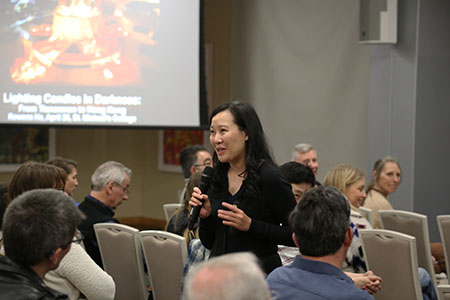
PowerPoint slides were part of the presentation.
She linked her long struggle alongside so many others on human rights issues to the present situation in the U.S., saying, “Injustice somewhere is a threat to justice everywhere ”; and, later, “I hope you will preserve democracy in your country. You were born with democracy and it is easy to take it for granted. But that was what we have to fight for generation after generation, paying the price of lives and freedom, blood and tears.”
The speaker recounted the time as a Saint Michael’s professor when she brought to campus, before a packed McCarthy Arts Center, Fang Zheng, brave activist from Tiananmen who had lost his legs during the massacre. Professor He remembered how some Chinese students at Saint Michael’s at that time responded angrily. “For them, growing up under the impact of the Patriotic Education Campaign, they considered those of us who were critical of the regime as traitors of China,” she said, “I was intellectually intrigued by such generational differences in the understanding of patriotism. For us, being patriotic meant following the Chinese intellectual tradition of Confucian Dissent to help the rulers to improve. But the younger generation tended not to distinguish between the regime and the nation and considered serious discussions of political and social issues as an insult to China and the Chinese people.” That was how she started her second book on Chinese student nationalism and she also shared how she was encouraged to see the awakening of political consciousness of Chinese students during the Paper Movement earlier this year in response to the government’s COVID policies.
A moving personal story near the end of He’s talk concerned another Tiananmen activist from 1989 whom she later met —at the time of the protest he was the art editor of a local daily newspaper who threw paint on a Mao image in Tiananmen Square, “and was turned into police by his own to avoid the movement being framed as a violent revolution trying to overthrow the government.” After spending 20 years in prison, he escaped from China and now lives in the U.S. When Professor He spoke with him, he remembered all important aspects of culture, society, and politics of China’s 1980s. This man was considered by many as mentally ill. Yet, she said, she came to realize that in many ways, “he was not insane – it’s the world that’s gone insane.”
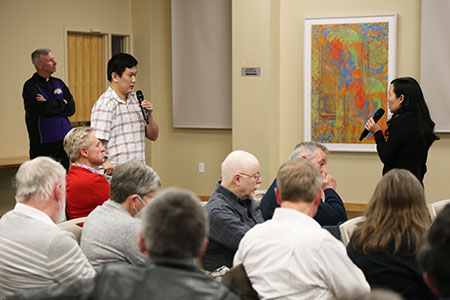
Student Jeson Li ’23 asks a question with Fr. Brian Cummings ’86 in the background left.
In a question and answer session after her nearly 90-minute talk, she answered several questions, including one from Fr. Brian Cummings, S.S.E. ‘86, director of Edmundite Campus Ministry, about the war in Ukraine. Professor He said when the war started, students in China were being told the official version of the Ukraine war in order to lay the groundwork for the Chinese leadership’s approach to Taiwan. “With domestic crisis in China, a war against foreign enemies would further provoke nationalism,” the speaker said later. “However, I warned that, nationalism is a double-edge sward. If they over-played it, it would become out of control and backfire.”
Student Jeson Li ’23, a native of China who also helped introduce Professor He, told of returning to China to visit family and friends in recent years, which made him appreciate his freedom of expression in the U.S. even more. The speaker said Jeson Li is a fine example of a Chinese student who makes our universities and colleges proud for providing possibilities and opportunities for change on our campuses with free speech and free inquiry. The crowd applauded that observation.
“Truth and Reconciliation. There will be no reconciliation without truth,” the speaker said shortly before wrapping up. “Let’s ask ourselves what we can do in our daily lives. Let’s make sure that we will present historical truth backed up with evidence. I hope you will never take democracy for granted. Once you lose it you will know you lose everything. Let’s don’t let that happen!”
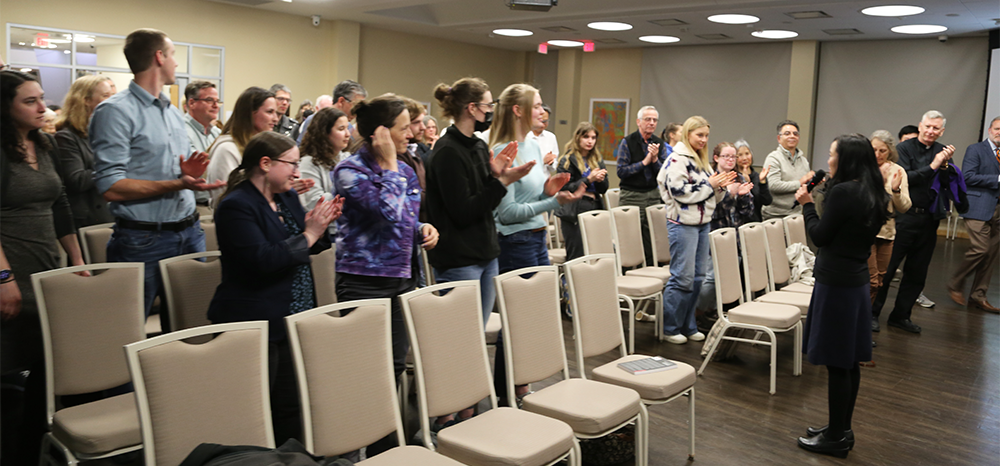
The audience gives Professor He a standing ovation after her lecture.

